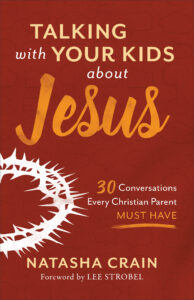Weaving Faith Conversations with Your Kids into Daily Life
How can you have natural, faith conversations with your kids’ in daily life? It’s the little moments that add up to big faith.

I was scrolling through Facebook recently when I saw an article that stopped me in my tracks: “5 Things People with Tidy Homes Don’t Do.”
I am constantly fighting a messy house. Whenever I take my kids to a friend’s home, I’m amazed at how relatively clean it is. How do they not have a pencil on every seat cushion? What do these parents know that I don’t?
The article I clicked on that day provided a tantalizing clue to the answer. The author wrote:
Tidy People don’t act like a slob all day, and then get their house tidy in one fell swoop. . . The number one thing I’ve learned from Tidy People is how valuable it is to develop some simple, non-drastic, tiny habits that, when added together, will change the level of tidiness in your home. Tidy People are in a constant state of lowgrade tidying.
Low-grade tidying. The point hit me like a ton of bricks. You see, my running assumption had been that I must have particularly messy kids. But those clean houses I visit aren’t the product of naturally clean kids. They’re the product of parents with good habits!
Low-Grade Tidying Is the Key to Faith Conversations
As parents, we’re often as overwhelmed by the task of having deep faith conversations with our kids as I am by the task of keeping a clean house. We have a rough idea of how our spiritual house should look, but we feel we’ve let things get messier than they should be. We know we should have more faith conversations than we do, the ones we do have don’t go as we’d like, and discouragement sets in when we don’t feel equipped to answer the questions our kids raise. These subtle disappointments are like pencils on seat cushions—nagging reminders that things aren’t where we’d like them to be.
I want to suggest a healthier mindset: know that impactful faith conversations happen through consistent low-grade tidying—not massive house clean-outs.
A massive house clean-out is overwhelming. I want you instead to think about long-term, low-grade spiritual tidying through ongoing conversation. I recommend doing that in three key ways.
Three Key Ways to Start Having Spiritual Conversations
First, focus on what most needs tidying in your child’s understanding of Jesus, given the challenging world in which they’re growing up. No one can clean absolutely everything, so having focus is key. Sunday school programs tend to teach only the basics of Christianity, and those basics are leaving kids unequipped to encounter today’s secular world.
Research consistently shows that at least 60 percent of kids who grow up in a Christian home walk away from Christianity by their early twenties, largely in response to intellectual challenges to their faith. Our kids need specific training for what they’ll encounter today, and they need that training from you.
Second, learn the most essential points your child should understand about each subject. The goal is to help you develop clarity on the essential points to emphasize in your conversations over time.
Third, get a vision for how to do your tidying and create the actual habit of tidying. You’ll have the tools for doing your work, but you’ll need to make the time to have these conversations.
Homes where deep and meaningful faith conversations happen regularly aren’t the product of lucky parents. They’re the product of intentional parents who believe nothing is more important than raising kids to know and love Jesus.
Reflection:
- Do you need to start having more regular faith conversations with your children? What faith conversation can you start having with them today?
- Make a plan to regularly have faith conversations with your children or your grandchildren and pray over these conversations ahead of time so that they may bring a deeper understanding of Jesus.
Were you inspired by this post? Check out the book Talking with Your Kids about Jesus: 30 Conversations Every Christian Parent Must Have by Natasha Crain. This book is your go-to guide to beginning to talk with your children about Jesus. Each chapter explains what skeptics of Christianity might say and provides you with a concise, easy-to-understand response you can discuss with your children to strengthen their faith.

Author bio: Natasha Crain is a national speaker, author, and blogger who is passionate about equipping Christian parents to raise their kids with an understanding of how to make a case for and defend their faith in an increasingly secular world. In addition to Talking with Your Kids about Jesus, she has authored two other apologetics books for parents: Keeping Your Kids on God’s Side and Talking with Your Kids about God. Natasha’s articles have been featured in the Focus on the Family magazine and the Christian Research Journal, and she’s been interviewed on radio shows across the country. She has an MBA from UCLA and a certificate in Christian apologetics from Biola University. She writes at NatashaCrain.com.

100 Words of Affirmation Your Son/Daughter Needs to Hear
Matt and Lisa Jacobson want you to discover the powerful ways you can build your children up in love with the beautiful words you choose to say every day–words that every son and daughter needs to hear.
These affirmation books offer you one hundred phrases to say to your son or daughter – along with short, personal stories and examples – that deeply encourage, affirm, and inspire.
So start speaking a kind and beautiful word into their lives daily and watch your children–and your relationship with them–transform before your eyes.







